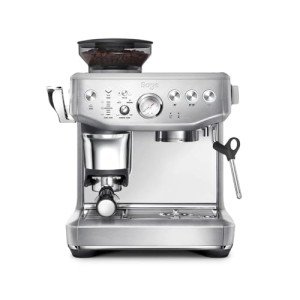Home Use Espresso Machines: A Comprehensive Guide
Espresso machines have become a staple in numerous households as coffee lovers seek to replicate café-quality brews in the convenience of their kitchen areas. Buy Espresso Coffee Machines in popularity has actually caused a varied market filled with various models, functions, and rates. This post aims to offer an informative overview of home use espresso machines, assisting readers navigate their choices efficiently.
Understanding Espresso Machines
Espresso machines work by requiring hot water through finely-ground coffee under high pressure, leading to a concentrated coffee beverage referred to as espresso. There are numerous types of espresso machines categorized based upon their developing approaches and level of automation. The most common types include:
- Manual Espresso Machines: These require the user to control the pressure and water flow, enabling a more hands-on coffee-making experience.
- Semi-Automatic Espresso Machines: These offer automatic control over water pressure, while the user manually grinds and tamps the coffee.
- Automatic Espresso Machines: With the push of a button, these machines instantly manage the circulation of water, making it simpler to brew espresso with constant outcomes.
- Super-Automatic Espresso Machines: These all-in-one machines deal with grinding, tampering, developing, and even milk frothing, making them ideal for users trying to find convenience.
- Pill or Pod Machines: These use pre-packaged coffee pods to produce espresso with minimal effort, however they restrict choice in developing methods and flavors.
Table: Comparison of Espresso Machine Types
| Type | Control Level | Alleviate of Use | Cleaning Level | Perfect For |
|---|---|---|---|---|
| Manual | User-controlled | Moderate | High | Coffee purists |
| Semi-Automatic | Partial automation | Moderate | Moderate | Home baristas |
| Automatic | Totally automated | Easy | Low | Hectic people |
| Super-Automatic | Completely automated | Very simple | Extremely low | Convenience applicants |
| Capsule/Pod | Fully automated | Extremely simple | Extremely low | Casual drinkers |
Key Features to Consider
When selecting a home use espresso machine, it's essential to think about various functions that can substantially affect the quality of espresso and user experience.
- Pressure: Look for machines that supply a minimum of 9 bars of pressure, as this is thought about ideal for brewing espresso.
- Boiler Systems: Single vs. dual boiler systems determine temperature stability and the capability to brew espresso and steam milk simultaneously.
- Grinder: Integrated mills permit freshly ground coffee, which improves taste. Consider machines with adjustable grind settings.
- Milk Frother: For those who take pleasure in cappuccinos and lattes, a built-in steam wand or automatic frother is essential.
- Size and Design: Consider your cooking area space and aesthetic preferences. Machines are available in various sizes, from compact to large setups.
- Price: Home espresso machines can vary from a couple of hundred to numerous thousand dollars, so it's essential to establish a budget before checking out options.
Benefits and drawbacks of Home Use Espresso Machines
| Pros | Cons |
|---|---|
| Convenience of developing coffee in your home | Preliminary financial investment can be high |
| Quality of espresso is often remarkable | Needs some skill, specifically with manual machines |
| Ability to try out tastes | Maintenance and cleaning can be labor-intensive |
| Can save money in the long run | Not all machines will match every coffee choice |
Upkeep and Cleaning Tips
Keeping an espresso machine is crucial for extending its life and guaranteeing constant brew quality. Here are some helpful ideas:
- Regular Descaling: Minerals from water can develop in the machine. Descale every 1-3 months, depending upon water solidity.
- Daily Cleaning: Rinse portafilters, baskets, and steam wands after each use to avoid coffee oils from constructing residue.
- Use Filtered Water: This can assist minimize mineral accumulation and improve the taste of coffee.
- Replace Gaskets and Seals: These elements may break in time and ought to be changed to preserve pressure and efficiency.
- Read the Manual: Each machine has specific care directions; following these will ensure longevity.
Frequently Asked Questions About Home Use Espresso Machines
Q1: What is the very best budget espresso machine?The best budget espresso machine typically depends on specific requirements, however models like the DeLonghi EC155 or the Breville Bambino are popular amongst users for supplying terrific worth. Q2: How long do home espresso machines generally last?With appropriate upkeep, home espresso machines can last anywhere from 5 to 15 years, depending upon the quality of the machine and frequency of use. Q3: Can I make cappuccinos and lattes with any espresso machine?While most espresso machines can make cappuccinos and lattes, having a trusted
steam wand or frother is important for accomplishing the best milk texture.
Q4: Are super-automatic machines worth the investment?For those who focus on convenience and quick brewing, super-automatic machines can be worth the financial investment, though they might lack some customizability in brew strength and flavor. Q5: What types of coffee beans are best for espresso?While individual choice contributes, beans identified as" espresso "blends are normally roasted darker, creating rich flavors and a velvety texture when brewed.
Investing in a home espresso machine can change the everyday coffee regimen into something unique, raising home brews to café quality. By comprehending the different kinds of machines, key functions to think about, upkeep needs, and weighing the
pros and cons, consumers can make educated decisions that match their specific preferences. As the espresso culture continues to grow, no matter the option, every brew can be a tasty experience waiting to be savored.

